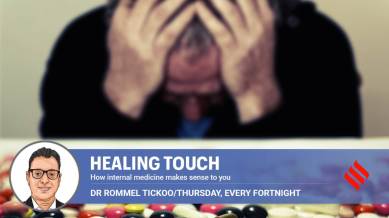30-year-old had headaches, dizziness and palpitations: Why Vitamin B12 deficiency may be difficult to spot
Not just vegetarians, even non-vegetarians can be deficient

A 30-year-old woman walked into our OPD complaining of headache, pain in the neck and shoulder region, dizziness, heaviness in the head and mild nausea. She said she had tingling in her hands and feet, felt palpitations and wobbly, probably due to fatigue. Yet her blood pressure, sugar readings and other parameters were normal. She had no history of either sinus or migraine. That left us with only one reason and although pretty sure, I ordered a routine blood test. It showed her to be deficient in Vitamin B 12.
Many least expect it but Vitamin B12 deficiency can cause severe headaches. Yet patients pop painkillers on their own. My patient did too but her symptoms came back after the relieving effects wore off. The woman was also low on iron.
monthly limit of free stories.
with an Express account.
Why low Vitamin B12 levels cause headaches
Her B12 deficiency possibly led to megaloblastic anaemia, where the body produces abnormally large red blood cells that don’t function properly, reducing their ability to carry oxygen to the brain. This low oxygenated blood flow causes the heart to pump more blood, leading to palpitations. Her tingling feet were probably because Vitamin B12 deficiency can lead to nerve damage, which can manifest as various neurological symptoms, including headaches. Research has shown that B12 deficiency can lead to cell damage in blood vessels, increase free radicals that damage our DNA and push up levels of an amino acid called homocysteine (building block of protein) which damages the lining of blood vessels. That’s why you may also see unusual symptoms like tongue inflammation.
Vitamin B12 deficiency can cause pernicious anaemia, which leads to frequent headaches. B12 is needed for producing red blood cells and DNA, while iron is needed for haemoglobin, a protein in red blood cells that carries oxygen. Studies suggest that a lack of B12 can worsen iron deficiency and enough of it improves iron utilization.
Not just vegetarians, even non-vegetarians may be deficient
For a long time, vegetarians and vegans have been considered to be deficient in vitamin B12 because this micronutrient can hardly be gotten from plant sources, except algae and mushrooms.
But just like my young patient, many non-vegetarians in the 30 to 40 age group are deficient in B12 because of absorption issues. The body may not be able to absorb enough B12 because of food intolerance, conditions like gastritis, autoimmune diseases and alcohol addiction. Certain medications like the common diabetes drug metformin, proton pump inhibitors which stop production of stomach acids, some antibiotics and oral contraceptives can limit absorption. Supplements are needed in these cases.
What’s the normal level of Vitamin B12?
The normal range is between 220 and 900 picograms per millilitre (pg/mL). However, we consider the 400-600 pg/mL as healthy. For migraine patients, supplements are given even when their level is 600 pg/mL to reduce the frequency of headaches. When diet and oral supplements are not enough, we give injections to patients to restore normal levels.
(Dr Tickoo is Director, Internal Medicine, Max Healthcare)